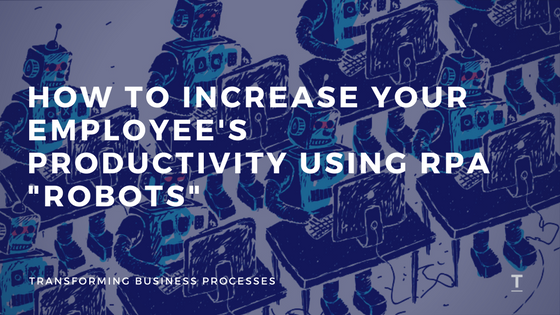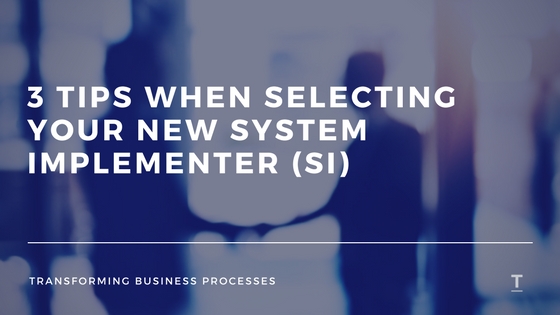
Are those manual and mundane tasks at work getting in the way of your employees focusing on higher value activities? What if a RPA “robot” could help drive up your employees productivity?
What is RPA?
Robotic Process Automation (RPA) is an intelligent software system commonly referred to as “bots”. RPA “bots” are capable of replicating the actions of an employee interacting with the user interface of their existing data sources and enterprise applications, e.g. Oracle, Microsoft, SAP, AS400 etc. They are capable of scraping data from web applications, websites, spreadsheets etc. They can perform back-office workflows in Finance and Accounting, Human Resources, Supply Chain Management and Project Management, to name a few.
In simple terms, a RPA is a functionally trained “robot” or automated employee capable of handling repetitive transactional business processes just like humans.
Why is RPA important?
- Provides significant reduction in operating costs through the automation of transactional type processing.
- Maximizes efficient use of constrained workforce – by freeing up your team to focus on customers (external or internal), and perform tasks that really add value to your organization.
- Significantly improves delivery quality by eliminating data-entry errors.
- Ensures data goes through the same rule for verification and consistency with the application’s business rule and logic. For instance, a W9 form is typically required in the US to onboard a supplier. RPA is capable of reading the scanned W9 from an email, input it into ERP and attach that same W9 to the supplier record. It can then use the same Tax-ID to run a public search to validate the supplier address as an example. Finally, it can send an email to the process owner to review and formally approve the supplier.
- Rapid ROI as “bots” could have a one-to-one relationship with a worker depending on the activities being performed.
- They don’t take holidays or sick days, nor do they take coffee breaks.
Where Can I Use RPA? Sample Use Cases
A bot can be scripted in a fraction of the time it takes to develop an application integration in the traditional sense. To realize value quickly with RPA, look for activities that require accessing multiple systems (if you have them), are labor intensive, repeatable and the desired outcome is known.
Below are some examples of the repetitive tasks performed by humans that RPA could do:
- Master Data Management – Use RPA to setup customers, suppliers, SKUs, project data in ERP.
- Load Daily Exchange rates into ERPs – Download exchange rates daily from websites and load into ERP including weekends and bank holidays.
- Enter AP Invoices into ERP from scanned or emailed PDF
- Daily Cash Position – Download bank statements daily and establish cash position.
- Process Direct Debits directly into ERP – Search for direct debit payments and post to ERP.
- Issue AP Payments – Generate payment batches in ERP and notify Treasury for review and approval
- Create Test Data – Use RPA to generate test data sets required for business applications. e.g. Create Suppliers, Create PO, Process Receipts against PO, Match Invoice against PO etc. Great use case for those organizations that frequently release enhancements or upgrades to their production environments.
Which Processes Are Best Suited for RPA?
Some processes are better suited to RPA than others. RPA is appropriate for tasks with the following characteristics:
- Manual and rule-based tasks – Can the tasks be performed without human judgment or intervention?
- Activities that are manual, high volume and prone to error.
- Activities involving a high number of employees and impacted by employee turnover.
- Processes that requires login and logout of application, copy and paste, drag and drop etc.
- Activities that are repeatable and static by nature where the steps to perform certain tasks rarely change. RPA can be scripted to adapt to changes in process.
As a Business Process Transformation company, we are seeing more RPA use where business process reengineering or application integration cannot be justified. RPA is becoming a viable and inexpensive alternative for application integration, and automating third-party applications, administrative or business processes.
RPA software tools have emerged as one of the biggest enablers for revolutionizing process efficiencies, increasing productivity and reducing the cost of manually intensive efforts.


thanks for sharing nice information…
more:http://www.opensourcetechnologies.in/corporate-training/rpa-corporate-training
Thanks for sharing nice information…
more:http://www.opensourcetechnologies.in/corporate-training/rpa-corporate-training..
thanks for sharing nice information…..
more : http://www.opensourcetechnologies.in/corporate-training/rpa-corporate-training
Really nice article.
aws training in hyderabad
Comments are closed.